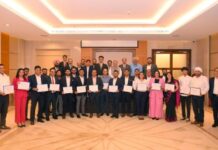Shri Suresh Prabhu, Hon. Union Minister for Railways applauded the initiative by Vijnan Bharati for becoming a partner in progress for the Smart city agenda by releasing a book “SMART Cities: The way India thinks” and setting the tone for the three leading city institutes, Ruia, Podar and Weschool who have now adopted Matunga(CR)station .
The three Institutes have brought about a great blend of science and commerce with design and management in their unique approach towards improving the user experience of lakhs of daily commuters
Mumbai Oct 10, 2015: Shri Suresh Prabhu, Hon. Union Minister for Railways was speaking at an event to mark the release of a report “SMART Cities: The way India thinks” ,a compilation of the inferences of the two day conference Smart City: Delivery of Civic Services organized by Vijnan Bharati, Mumbai held in association with WeSchool in June 2015. The two day conference was truly a reflection of what India thinks and aspires as it had brought together 40 eminent experts from the fields related to smart city development with a special focus on the “Delivery of Civic Services” to citizens. The well rounded approach to the conference under the leadership of renowned habitat expert Dr. Madhav Chitale and Shri Jayant Sahasrabuddhe, organizing secretary, Vijnan Bharati was initiated bearing in mind the ground reality that the existing infrastructure of Bharat can be best augmented by proposing Bharat Centric Solutions was reflected in the report released at the hands of the Railway Minister at WeSchool.
During the brainstorming session held on the sidelines of the event, presentations from the Mumbai Metro and consulting firm KPMG outlined their vision for turning the metropolis into Smart city by offering smart, seamless transport, the summary of the report presented during the next session outlined a much bigger vision to enable cities to promote economic growth that is inclusive, achieve human development goals and attain environmental sustainability. The 360 degrees view presented in the report covered detailed aspects of Process Of urbanization, Urban living conditions, Components that define a smart city, Indigenous angles in planning and also set the tone for the development of ‘habitat lab’ to capture the vibrancy and living heritage of our city as well as well as initiating management programs in urban planning in consultation with leading institutes like WeSchool. Shri Jayakumar A, Secretary General of Vijnan Bharati was also among the dignitaries at the event.
While releasing the report presented by Vijnan Bharati titled, “SMART Cities: The way India thinks”, Shri Suresh Prabhu, Hon’ble Union Minister for Railways applauded the collaborative efforts put in by all stakeholders emphasized that indeed it is the power of “we” that is required to make social transformations more impactful.
“As education opens the horizons, science and technology provide the tools, and all these must come together to form the building blocks for the new civilization that will grow in our smart cities. India will soon be the most populous country in the world, migration will be inevitable and the cities are going to grow. We need to understand why a particular city is growing, its unique character, and its ethos as each city is different. When we turn them into smart cities, it may be the smartest city, yet if the quality of life is not good, the city will fail. I am glad that Vijnan Bharati created this confluence of experts to deliberate on the issues involved and have come up with suggestions that will help in strengthening our efforts in fulfilling the national agenda.”
While focusing on transport in general and railways in particular, the Minister expressed , “the railways stations can become icons, not only for the comfort and convenience that they offer but also acquire the status as tourist destinations by attracting eyeballs as well as footprint. Development of 400 stations was envisaged in this year’s railway budget. Centre, state, the local Municipal corporations and other stakeholders should come together to address the challenges in developing our stations and offer well integrated, seamless travel for our citizens.”
And in the spirit of taking the agenda of Smart Cities forward the three leading educational institutes from Matunga had come together to announce the adoption of Matunga (CR) station for the benefit of its thousands of commuting students, people thronging the surrounding business district and local residents of Matunga. The goal of the project is to go beyond the basics and use design thinking and intelligence gathering through pain-points of various stakeholders and collectively design a better user experience and space management. Transforming Self-Organization and then Society through collective wisdom and create multiple customized solutions which are inclusive and humane is WeSchool’s connect with the nations vision of Smart cities.
“In our mission to groom the citizens for future, educational institutes must focus on their role of providing the young students with skill-sets that will contribute to the national agenda as well as global business, as India’s share in the global business is expected to rise by several billions by 2020. Matunga has some of the best educational institutes and with a population of nearly 70,000 students, can we not look at the possibility of turning this ecosystem into a student-centric University township that will nurture our Global Citizen Leaders. Academic institutes have a larger role to play for the greater good, must take ownership of the vicinity, include the excluded, and our efforts to develop Matunga station as well as ‘Celebration Street’ are the collaborative steps in that direction.”, explained Prof Dr Uday Salunkhe, Group Director, WeSchool while outlining his vision behind this step to turn a small part of this burgeoning metropolis into a Smart district.
Prof Dr Suhas Pednekar, Principal, Ramnarain Ruia College and President, Vijnan Bharati (Mumbai) concurred by saying that, “The Conference Smart City: Delivery of Civic Services was only the beginning. When we talk about fulfilling the national agenda be it in Swachh Bharat, Digital India, Make in India, academia must be included in it as its important pillar. I am glad that we are not only able to present the findings of the conference to the government for its possible implementation but are at our own level setting an example by taking the agenda forward by turning the surrounding area into a University township”.
Corporate Comm India (CCI Newswire)




















